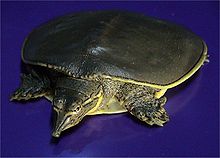Trionychia
Appearance
| Trionychia Temporal range: Late Jurassic to recent,
| |
|---|---|

| |
| The spiny softshell turtle (Trionychidae) | |

| |
| The pig-nosed turtle (Carettochelyidae) | |
| Scientific classification | |
| Domain: | Eukaryota |
| Kingdom: | Animalia |
| Phylum: | Chordata |
| Class: | Reptilia |
| Order: | Testudines |
| Suborder: | Cryptodira |
| Clade: | Polycryptodira |
| Superfamily: | Trionychia Hummel, 1929[1] |
| Families | |
|
Carettochelyidae | |
| Synonyms | |
| |
Trionychia is a superfamily of turtles which encompasses the species that are commonly referred to as softshelled turtles as well as some others. The group contains two families, Carettochelyidae, which has only one living species, the pig-nosed turtle (Carettochelys insculpta) native to New Guinea and Northern Australia, and Trionychidae, the softshelled turtles, containing numerous species native to Asia, North America and Africa. These families likely diverged during the late Jurassic.[2] The oldest known stem-trionychian is Sinaspideretes from the Late Jurassic of China.[3][4]
Systematics
[edit]Except for those not assigned to a family, only living genera are listed here.
- Family Carettochelyidae
- Subfamily Carettochelyinae
- Genus Carettochelys
- Subfamily Carettochelyinae
- Pan-Trionychidae
- Family Plastomenidae[5] (fossil)
- Family Trionychidae
- Subfamily Cyclanorbinae
- Genus Cyclanorbis
- Genus Cycloderma
- Genus Lissemys
- Subfamily Trionychinae
- Genus Amyda
- Genus Apalone
- Genus Chitra
- Genus Dogania
- Genus Nilssonia
- Genus Palea
- Genus Pelochelys
- Genus Pelodiscus
- Genus Rafetus
- Genus Trionyx
- Subfamily Cyclanorbinae
References
[edit]- ^ Rhodin 2011, p. 000.204
- ^ Pereira, Anieli G.; Sterli, Juliana; Moreira, Filipe R.R.; Schrago, Carlos G. (August 2017). "Multilocus phylogeny and statistical biogeography clarify the evolutionary history of major lineages of turtles". Molecular Phylogenetics and Evolution. 113: 59–66. doi:10.1016/j.ympev.2017.05.008. hdl:11336/41137. ISSN 1055-7903. PMID 28501611.
- ^ Ouyang, Hui; Li, Lu; Tong, Haiyan (July 2014). "A revision of Sinaspideretes wimani Young & Chow, 1953 (Testudines: Cryptodira: Trionychoidae) from the Jurassic of the Sichuan Basin, China". Geological Magazine. 151 (4): 600–610. Bibcode:2014GeoM..151..600T. doi:10.1017/S0016756813000575. ISSN 0016-7568. S2CID 128423062.
- ^ Evers, Serjoscha W.; Benson, Roger B. J. (January 2019). Smith, Andrew (ed.). "A new phylogenetic hypothesis of turtles with implications for the timing and number of evolutionary transitions to marine lifestyles in the group". Palaeontology. 62 (1): 93–134. doi:10.1111/pala.12384. S2CID 134736808.
- ^ One or more basal lineages formerly believed to be a distinct family
- Bibliography
- Rhodin, Anders G.J.; van Dijk, Peter Paul; Inverson, John B.; Shaffer, H. Bradley; Roger, Bour (2011-12-31). "Turtles of the world, 2011 update: Annotated checklist of taxonomy, synonymy, distribution and conservation status" (PDF). Chelonian Research Monographs. 5. Archived from the original (PDF) on 2012-01-31.
